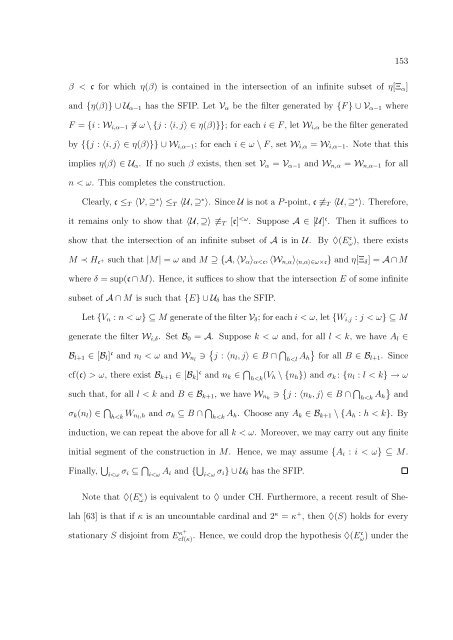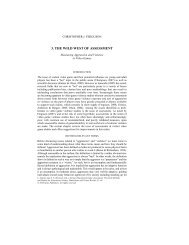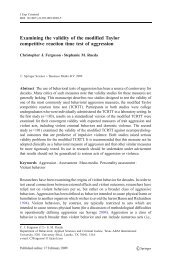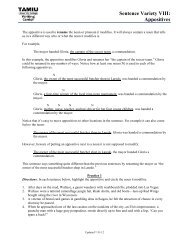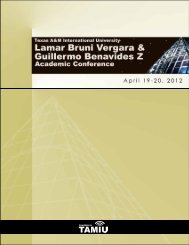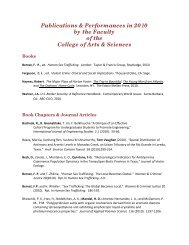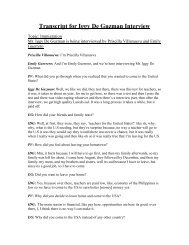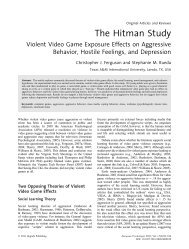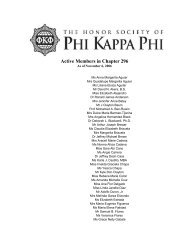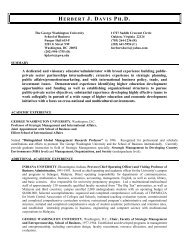- Page 1 and 2:
ORDER-THEORETIC INVARIANTS IN SET-T
- Page 3 and 4:
compactum without reducing its cell
- Page 5 and 6:
Contents Abstract i Acknowledgement
- Page 7 and 8:
Bibliography 160 vi
- Page 9 and 10:
of certain products of homogeneous
- Page 11 and 12:
An ordinal α is regular if α = cf
- Page 13 and 14:
• regular if for all closed C ⊆
- Page 15 and 16:
• locally κ-compact if for every
- Page 17 and 18:
The category of boolean algebras is
- Page 19 and 20:
B is a base of X if and only if, fo
- Page 21 and 22:
A regular cardinal κ is a caliber
- Page 23 and 24:
the supremum of the local Noetheria
- Page 25 and 26:
• An subset S of M n is definable
- Page 27 and 28:
1.7 Forcing Definition 1.7.1. The C
- Page 29 and 30:
• M[G] |= ϕ(σ (0) G , . . . ,
- Page 31 and 32:
• a reduction of a map g : Q →
- Page 33 and 34:
Definition 1.7.16. The product P ×
- Page 35 and 36:
If S is a stationary subset of a re
- Page 37 and 38:
Chapter 2 Amalgams 2.1 Introduction
- Page 39 and 40:
properties to this particular conne
- Page 41 and 42:
Theorem 2.2.2. The classes listed b
- Page 43 and 44:
Theorem 2.2.3. Suppose X and YS are
- Page 45 and 46:
Definition 2.2.7. Suppose W is a su
- Page 47 and 48:
y Theorem 2.3.1, ˜ Y is path-conne
- Page 49 and 50:
compactum with cellularity c. Moreo
- Page 51 and 52:
y(Si) for all i < m. Let W be an op
- Page 53 and 54:
Chapter 3 Noetherian types of homog
- Page 55 and 56:
Finally, in Section 3.5, we prove s
- Page 57 and 58:
Given Theorem 3.2.2, justifying Obs
- Page 59 and 60:
and V ∈ Bm and U V . Then m = n
- Page 61 and 62:
Definition 3.2.12. Given a space X,
- Page 63 and 64:
Proof. We will only prove the first
- Page 65 and 66:
Proof. Let A be a neighborhood base
- Page 67 and 68:
We may assume there exists an n <
- Page 69 and 70:
intervals i∈I (ai, bi) such that
- Page 71 and 72:
p ≥ q iff, for all σ ∈ ζ and
- Page 73 and 74:
V ∈ V. By Theorem 3.3.2, Q is alm
- Page 75 and 76:
Proposition 3.3.11. Suppose a point
- Page 77 and 78:
than κ. Then a κ-approximation se
- Page 79 and 80:
κ. Let Υ(δγ) = 〈β0, . . . ,
- Page 81 and 82:
subset of Gα. For all I ⊆ P(2 κ
- Page 83 and 84:
such that V 1 ⊆ W . Therefore, h
- Page 85 and 86:
we have A, N , Mα ∈ Mα+1 ≺ H
- Page 87 and 88:
We prove this claim by induction. F
- Page 89 and 90:
Proof. Let 〈Xi〉i∈I be a seque
- Page 91 and 92:
Set A = Aκ∪Aλ∪Ap. Let us show
- Page 93 and 94:
exists τ ∈ [Aα]
- Page 95 and 96:
Theorem 3.4.3. If κ ≥ ω and B h
- Page 97 and 98:
The following theorem is implicit i
- Page 99 and 100:
W ⊆ f −1 {0}. By (3) for stage
- Page 101 and 102:
3.5 More on local Noetherian type I
- Page 103 and 104:
has an open neighborhood Wx that is
- Page 105 and 106:
for all σ ∈ [U]
- Page 107 and 108:
Lemma 3.5.14. Suppose X is a space,
- Page 109 and 110: πNt(X) ≥ ω1? Question 3.6.3. Su
- Page 111 and 112: Theorem 4.1.3. If X is a homogeneou
- Page 113 and 114: ase of X? Is there such a metric sp
- Page 115 and 116: Set Uα = i
- Page 117 and 118: Corollary 4.2.15. Let X be a compac
- Page 119 and 120: Corollary 4.2.19 (GCH). There do no
- Page 121 and 122: finite cover of X and pairwise ⊆-
- Page 123 and 124: w = min([p1, max X] \ U). Then w
- Page 125 and 126: points p of Y , there exists α <
- Page 127 and 128: x ∈ [ω] ω splits every y ∈ A.
- Page 129 and 130: Lemma 5.2.6. Let X be a compact spa
- Page 131 and 132: κ ss2 ≤ κ. Every nontrivial fin
- Page 133 and 134: Proof. Let P be the κ-long finite
- Page 135 and 136: Remark 5.4.2. If P is a finite supp
- Page 137 and 138: Let J be the P-name {〈ˇα, pα
- Page 139 and 140: are no such α and β, then let Qσ
- Page 141 and 142: For each α < λ, let xα be the Co
- Page 143 and 144: Proof. See Exercise A12 on page 289
- Page 145 and 146: Let Fλα+β to be a Pλα+β-name
- Page 147 and 148: Proof. Fix p ∈ ω ∗ . By a resu
- Page 149 and 150: χ(〈p〉i
- Page 151 and 152: Then χ(p, X) < w(X) or Nt(X) > µ.
- Page 153 and 154: Question 5.7.10. Is cf c < χNt(ω
- Page 155 and 156: • P ≤T P × Q. • P ≤T R ≥
- Page 157 and 158: changed. Moreover, since ω × ω1
- Page 159: Theorem 6.3.7. Assume ♦(E c ω) a
- Page 163 and 164: show that, for a fixed regular unco
- Page 165 and 166: and i ∈ dom Γ such that for all
- Page 167 and 168: Bibliography [1] O. T. Alas, M. G.
- Page 169 and 170: [20] R. Engelking, General Topology
- Page 171 and 172: [39] K. Kunen, Weak P-points in N
- Page 173 and 174: [60] B. É. ˇ Sapirovskiĭ, Cardin


